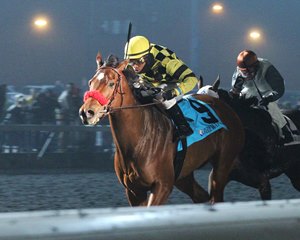Nighttime Tracks Work Together on Post Times


With synchronized watches in place, even Batman and Robin would be proud of the efforts by a number of night tracks to coordinate their post times, avoid racing on top of one another, and prevent extended periods of inaction.
Racing officials at Hollywood Casino at Charles Town Races, Delta Downs Racetrack, Hollywood Casino at Penn National Race Course, and Turfway Park have worked to put optimal start times in place for bettors interested in playing multiple signals. Sam Houston Race Park plans to join the group when it begins night races in January, and executives from racing channel and advance-deposit wagering outlet TVG also have worked with the tracks.
A BloodHorse look at a recent night of racing indicates the effort is succeeding.
From 6:06 p.m. to 10:06 p.m. ET Dec. 13, Penn National, Turfway, Delta, and Charles Town offered 32 races. During this stretch, no races started closer than three minutes apart, and the longest gap in action was 12 minutes.
The average time between races at those four tracks during the five-hour stretch was 7.9 minutes. Especially impressive was that only twice did races start within four minutes or less of one another, and only twice was there a gap of 12 minutes. Twenty-five of the gaps between these 32 races were 6-11 minutes.
"The goal is for the night signal to act as one product for the gamblers, a place where they know they're going to get good-sized fields and consistent action, as opposed to three tracks going off at one time, two going off at another, and then 20 minutes in between races," said Turfway general manager and director of operations Daniel "Chip" Bach. "We think it will benefit everybody. All the ships will rise together."
In terms of the nightly effort to keep the race times properly staggered, tracks rely on The Jockey Club's InCompass Solutions post-time coordination program, emails, phone calls, and, especially, a group text. Erich Zimny, vice president of racing and sports operations at Charles Town, noted the texts are important when unexpected delays occur, which allows other tracks to adjust their schedules.
"There are some pitfalls because you can schedule times as best you can, but there are going to be moments during the night that throw you off—be it an inquiry or something else that gets you off timing," Zimny said. "We have a good, nice little text list for the tracks that run at night, and we're able to kind of coordinate on the fly a little better with that."
Bach noted that a quick adjustment following a delay can keep races off one another and that the tracks have all made a commitment to try to quickly get back on schedule after any race delay.
"If a track has a problem, it won't be obvious to the other racetracks, so we'll pop out by text that, 'Hey, we're going to go off at 9:37 as opposed to 9:33.' Then they can make some small adjustments around that, so two tracks don't go off at the same time," Bach said. "We've been trying to commit to off times, and if something happens that changes that, we try to get back to our original off time."
Zimny credited David Koepp, simulcast manager at Penn National Gaming, with bringing the group together. He noted some tracks adjusted their schedules by adding more time between races to help make the staggered times possible.
As the effort hits its stride, Bach said they are discussing ideas of marketing the continuing action being offered.
"It's really a customer-service issue. When races are on top of one another, you're forcing the customer to make a choice of what they're going to watch or what they're going to play," Zimny said. "By not doing that, you're really giving the customer a wider menu of options. That was really the driver."
